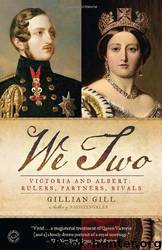We Two: Victoria and Albert: Rulers, Partners, Rivals by Gillian Gill

Author:Gillian Gill
Language: eng
Format: epub
Tags: Great Britain, 19th century, General, Royalty, Biography & Autobiography, Modern, History, Europe, Historical
Publisher: Ballantine Books
Published: 2009-07-15T05:03:12+00:00
The Greatest Show on Earth
…
HE QUEEN AND THE PRINCE DID NOT SPEND THEIR WHOLE YEAR ON their private estates, and they had far less leisure than most of England’s upper crust. The prince especially dedicated himself to the business of government, and he was increasingly active in charitable organizations and arts groups.
On the spectrum of mid-nineteenth-century British politics, Prince Albert was a moderate Tory, even a Liberal on some issues, but never a radical. In his capacity as the Queen’s chief adviser and personal secretary, he worked smoothly with government ministers of both parties, and in domestic affairs his was consistently a voice of enlightenment and a force for good.
He was intelligent and exceptionally well informed on the issues of the day, from the design of small-bore rifles for the army to reform of the church schools in Ireland. When he agreed to chair or sponsor an organization, be it the Society for the Abolition of Slavery, the Royal Horticultural Society, Trinity House (an organization devoted to saving lives at sea), or the Committee to Erect the New Houses of Parliament, he was an inspiration. He did his homework, was an exemplary correspondent, delivered thoughtful speeches, and always tried to think the issues through without prejudice.
He was in favor of social reform far more than his wife, who found it difficult to sympathize with the problems of people she did not know. Albert saw poverty as an ethical issue that, as the public voice of the Crown, it was his duty to address. He did all he could to investigate labor conditions in person, and the industrialists and engineers who took him round a system of locks here or a woolen mill there were always impressed by the depth of his knowledge. In his public speeches as well as in his committee work, he sought to convince the nation that its greatness depended on finding solutions to the problems of the poor. Reading the official reports that unveiled the horrendous conditions prevailing in British mills and mines, he contacted Lord Shaftesbury, who was leading the campaign for industrial reform, and offered to preside over the Society for Improving the Condition of the Working Classes.
Albert was a scholar at heart, and he brought a valuable European perspective to the question of university education. He was a rare bird in England’s establishment in the mid-nineteenth century because he was as passionately interested in science and technology as he was in music and the arts. Keen to put his ideas into practice, he allowed his name to be put forward for election to the chancellorship of the University of Cambridge. Dyed-in the-wool conservatives among Cambridge graduates did their utmost to block the prince’s election, but, happily, they failed. Far from content to be a figurehead, Albert placed himself at the head of the Cambridge dons who were convinced that the university could regain its status as an intellectual powerhouse only if it encouraged scientific and technological research and stressed mathematics and the sciences for its undergraduates.
Download
This site does not store any files on its server. We only index and link to content provided by other sites. Please contact the content providers to delete copyright contents if any and email us, we'll remove relevant links or contents immediately.
| Africa | Asia |
| Canadian | Europe |
| Holocaust | Latin America |
| Middle East | United States |
Fanny Burney by Claire Harman(25778)
Empire of the Sikhs by Patwant Singh(22163)
Out of India by Michael Foss(16309)
Leonardo da Vinci by Walter Isaacson(11896)
Small Great Things by Jodi Picoult(6086)
The Six Wives Of Henry VIII (WOMEN IN HISTORY) by Fraser Antonia(4784)
The Wind in My Hair by Masih Alinejad(4420)
The Lonely City by Olivia Laing(4112)
The Crown by Robert Lacey(4099)
A Higher Loyalty: Truth, Lies, and Leadership by James Comey(4026)
The Iron Duke by The Iron Duke(3636)
Millionaire: The Philanderer, Gambler, and Duelist Who Invented Modern Finance by Janet Gleeson(3565)
Sticky Fingers by Joe Hagan(3449)
Alive: The Story of the Andes Survivors by Piers Paul Read(3303)
Papillon (English) by Henri Charrière(3264)
Joan of Arc by Mary Gordon(3253)
Stalin by Stephen Kotkin(3081)
Aleister Crowley: The Biography by Tobias Churton(3015)
Ants Among Elephants by Sujatha Gidla(2920)
